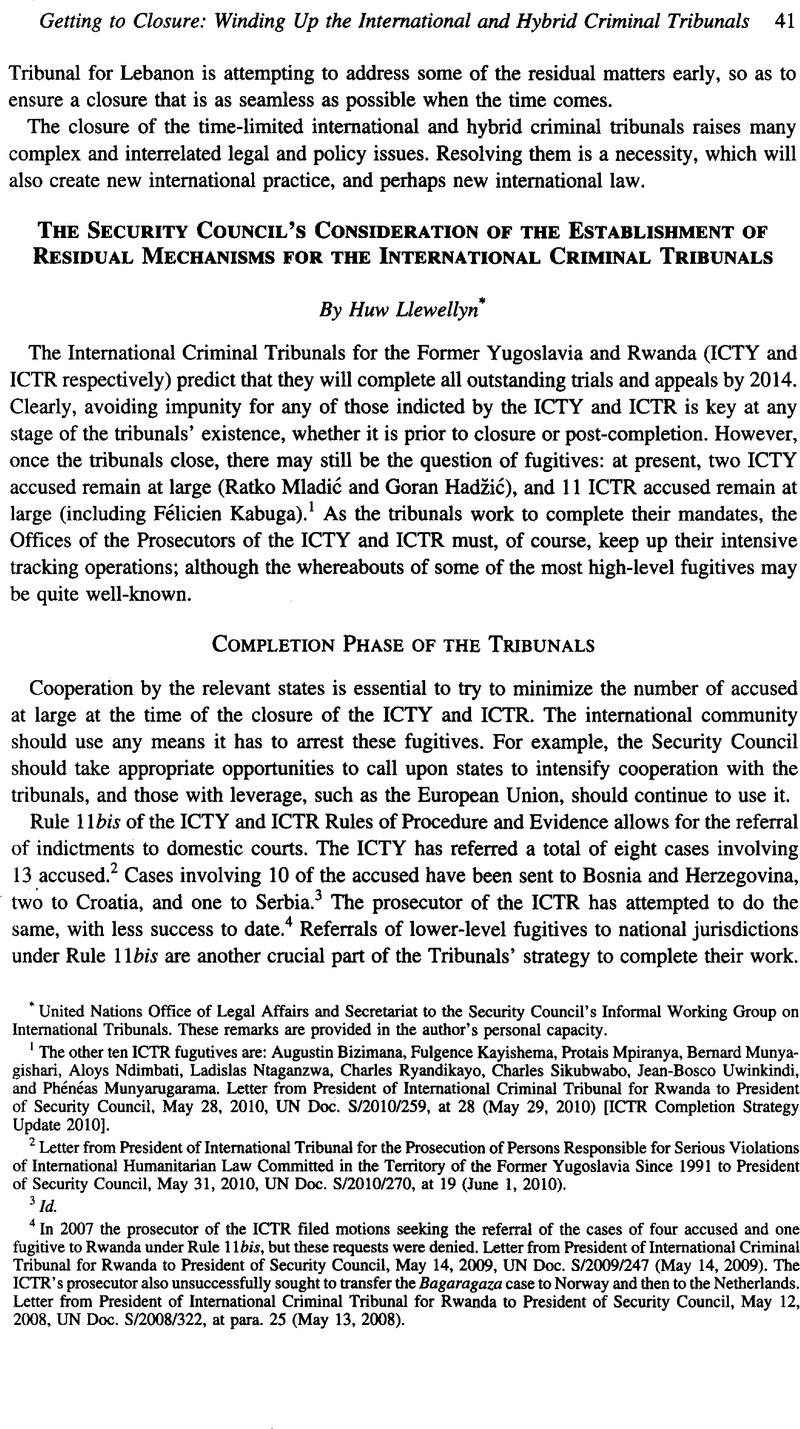No CrossRef data available.
Article contents
The Security Council’s Consideration of the Establishment of Residual Mechanisms for the International Criminal Tribunals
Published online by Cambridge University Press: 28 February 2017
Abstract

- Type
- Getting to Closure: Winding Up the International and Hybrid Criminal Tribunals
- Information
- Copyright
- Copyright © American Society of International Law 2010
References
1 The other ten ICTR fugutives are: Augustin Bizimana, Fulgence Kayishema, Protais Mpiranya, Bernard Munyagishari, Aloys Ndimbati, Ladislas Ntaganzwa, Charles Ryandikayo, Charles Sikubwabo, Jean-Bosco Uwinkindi, and Phénéas Munyarugarama. Letter from President of International Criminal Tribunal for Rwanda to President of Security Council, May 28, 2010, UN Doc. S/2010/259, at 28 (May 29, 2010) [ICTR Completion Strategy Update 2010].
2 Letter from President of International Tribunal for the Prosecution of Persons Responsible for Serious Violations of International Humanitarian Law Committed in the Territory of the Former Yugoslavia Since 1991 to President of Security Council, May 31, 2010, UN Doc. S/2010/270, at 19 (June 1, 2010).
3 Id.
4 In 2007 the prosecutor of the ICTR filed motions seeking the referral of the cases of four accused and one fugitive to Rwanda under Rule 1 Ibis, but these requests were denied. Letter from President of International Criminal Tribunal for Rwanda to President of Security Council, May 14, 2009, UN Doc. S/2009/247 (May 14, 2009). The ICTR’s prosecutor also unsuccessfully sought to transfer the Bagaragaza case to Norway and then to the Netherlands. Letter from President of International Criminal Tribunal for Rwanda to President of Security Council, May 12, 2008, UN Doc. S/2008/322, at para. 25 (May 13, 2008).
5 The ICTR’s Office of the Prosecutor has indicated that it is consulting with Rwanda
with a view to resolving a number of issues related to witness protection and other matters raised by the Trial Chambers and the Appeals Chamber in their decision on prior requests for referrals under Rule 11bis. The Prosecutor intends to file further applications for referral of fugitives’ cases to Rwanda. It is expected that the applications will be made towards the last quarter of 2010.
ICTR Completion Strategy Update 2010, supra note 5, at para. 60.
6 Residual functions include trial of fugitives, trial of contempt cases, protection of witnesses, review of judgments, referral of cases to national jurisdictions, supervision of enforcement of sentences, assistance to national authorities, and management of the archives. These functions are addressed in Report of the Secretary-General on the Administrative and Budgetary Aspects of the Options for Possible Locations for the Archives of the International Tribunal for the Former Yugoslavia and the International Criminal Tribunal for Rwanda and the Seat of the Residual Mechanism(s) for the Tribunals, UN Doc. S/2009/258 (May 21, 2009).


